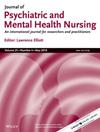Caregivers' experiences in helping individuals with severe and enduring mental health challenges integrate into the community: A qualitative descriptive study in Singapore
Abstract
What is known about the subject
- Individuals with severe and enduring mental health challenges continued to consume mental health services for an average of 13 years as they needed multiple acute psychiatric admissions due to the challenges they experienced in their everyday activities.
- As caregivers of individuals with severe and enduring mental health challenges, they often bear the brunt of caregiving through their assistance with activities of daily living (ADL), providing emotional support and ensuring medication compliance for their loved ones.
- When caring for their loved ones, caregivers often reported psychological stress, social isolation and emotional exhaustion due to stressors such as uncertainty of the future, the lack of support from professional services and the isolation from their own social network and support mechanism.
What the paper adds to existing knowledge
- Insights from this study revealed that caregivers for individuals with severe and enduring mental health challenges went through a lonely and exhausting journey fraught with psychological, physical, social and financial challenges, echoing the caregiving needs and the prevalence of the caregiver burden.
What are the implications for practice
- Insights shared by the caregivers demonstrated the need for a centralised point of contact to navigate Singapore's fragmented mental healthcare sector.
- Peer-support groups should be further promoted because they offer the benefits of information exchange, mutual support and a sense of empowerment and hopefulness, which may help ease the caregiver burden.
- Life skills training, such as teaching how to communicate empathetically with family members, resolve conflicts using open communication, maintain a structured daily routine and solve pragmatic problems in daily life, is more critical for individuals with severe and enduring mental health challenges. This will help them learn how to manage their well-being, live independently, and stabilise their conditions.
- Lastly, public awareness campaigns should honour caregivers by highlighting their strength, resilience, and dedication. The state can provide financial assistance in the form of tax relief for their income per annum or caregiver allowance to alleviate the financial stress that caregivers are facing.
4.1 Introduction
The progressive deinstitutionalisation of mental healthcare has increasingly shifted care responsibilities from healthcare professionals to family caregivers for individuals with severe mental illness. Caregivers must balance many obligations, which often compromise their overall health and well-being, while helping their loved ones integrate into the community.
4.2 Aim
To identify and understand caregivers' needs and challenges as they help individuals with severe and enduring mental health challenges integrate into the community.
4.3 Methods
This study used a descriptive qualitative approach to explore the experiences and challenges of caregivers for individuals with severe and enduring mental health challenges when integrating back into the community. A semi-structured guide was used during the video-conferencing interviews conducted between December 2021 and November 2022. This study was reported according to the 32-item Consolidated Criteria for Reporting Qualitative Research (COREQ) checklist.
4.4 Findings
Fourteen caregivers were individually interviewed by the primary author. Most caregivers were female, with an average of 15 years of experience caring for their loved ones. Using Braun and Clark's six-phase thematic framework, we inductively generate the themes and subthemes from the data. The two themes were (i) challenges (whose subthemes included personal challenges in caregiving, the lack of awareness, and stigma and employment) and (ii) support (whose subthemes included the importance of socialisation for individuals with mental health conditions, existing avenues of support and potential areas for support).
4.5 Discussion
Our findings informed the contemporary needs of caregivers caring for individuals with severe and enduring mental health challenges integrating into the community. Like the global challenges for people with mental health issues, psychosocial support and other supplementary support are still common themes in mental health settings. The findings further specifically highlighted the importance of accessible points of contact as resources and employment-enabling and sustaining initiatives to help manage caregivers' emotional and system challenges, which addresses the gaps identified in the findings. Caregivers' peer-support groups, life skills training and public mental health awareness are also necessitated by the caregivers' voices.
4.6 Implications for Practice
Priority areas include having a centralised point of contact within the community for caregivers. Government or not-for-profit organisations can take the lead by initiating employment-enabling initiatives for individuals with severe and enduring mental health challenges and their caregivers.

 求助内容:
求助内容: 应助结果提醒方式:
应助结果提醒方式:


